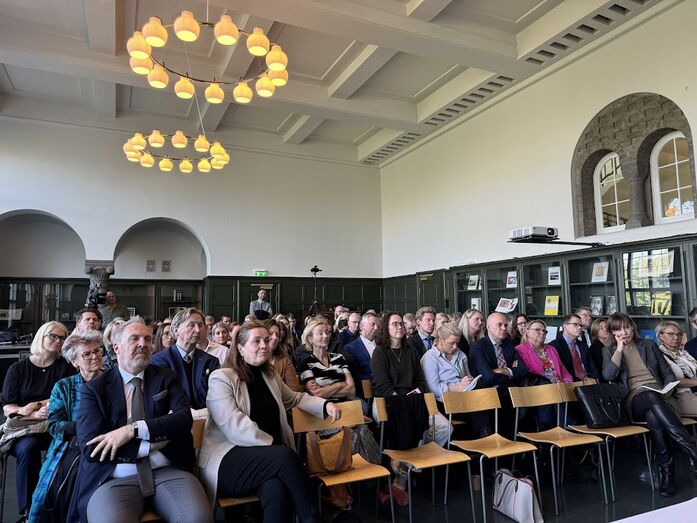EEA is not an external imposition
Pallborðsorð á EES-fundi 3. septemner 2024.
Inngangsorð í pallborðsumræðum um EES-samminginn 3. september 2024 í Safnahúsinu.
In the wake of the Soviet Union's dissolution, the European Economic Area (EEA) Agreement was established. Remarkably, it remains strong today, thriving in a geopolitical landscape that has changed dramatically since its inception.
Reflecting on the past five years since I co-authored a report on Iceland and the EEA, it is evident that the discourse surrounding our participation in the Single Market has evolved significantly. No longer is the question of whether our constitution allows us to participate at the forefront of our concerns. After 30 years, EEA membership has become an integral part of our sovereignty.
 Séð yfir salinn á EES-fundinum 3. sept. 2024.
Séð yfir salinn á EES-fundinum 3. sept. 2024.
Today, the EEA is not viewed as an external imposition but as a framework through which Iceland exercises and enhances its rights. While challenges undoubtedly exist, they are met with established practices and a shared commitment to finding balanced solutions.
In his insightful views Mr. Letta emphasizes the importance of economic security and the EU's need to extend its reach.
Iceland’s experience demonstrates that small states can preserve their sovereignty while actively participating in broader economic frameworks. This, I believe, could serve as an example to other non-EU states as they navigate their relationships with the EU and assess their own sovereignty.
In terms of economic security, our focus must be on safeguarding the long-term interests of the Single Market. It is crucial that EEA countries are resilient enough to withstand economic shocks and protect against vulnerabilities that external actors may seek to exploit. The threats we face today often stem from autocracies that disregard the rules-based world order and the rule of law.
As Mr. Letta has rightly pointed out, we must adapt the Single Market to align with global shifts, rather than viewing global dynamics solely through the lens of the Single Market. The geopolitical changes of recent years underscore the importance of focusing on the external dimension of the Single Market, ensuring its relevance in an ever-changing world.
It is within this global context that we must discuss the future of our cooperation, aiming to make it more robust and sustainable. I welcome the positive attitude towards EEA cooperation that has been emphasized by the EU in recent years.
Notably, after Mrs. Ursula von der Leyen became President of the European Commission in December 2019, it was welcomed that responsibility for the EEA was moved to the portfolio of the European Commission's Vice-President for the European Green Deal, Interinstitutional Relations, and Foresight.
This shift highlights the EEA’s significance, not only as a framework for economic cooperation but also in advancing broader EU policy goals, including sustainability and forward-looking governance.
The EEA EFTA countries face many challenges, both internal and external, when implementing the Agreement. However, just as we have done over the past 30 years, I am confident that we will continue to overcome these challenges in the future.
--
Frummælendur á fundinum voru Enrico Letta, fyrrverandi forsætisráðherra Ítalíu og höfundur nýlegrar skýrslu um framtíð innri markaðarins, og Line Eldring, formaður EES-nefndar norskra stjórnvalda sem skilaði nýlega af sér skýrslu um þróun og reynslu Noregs af EES-samstarfinu síðustu ár.
Þórdís Kolbrún Reykfjörð Gylfadóttir, utanríkisráðherra, settu fundinn. Að loknum erindum voru pallborðsumræður þar sem við Sigríður Mogensen, sviðsstjóri iðnaðar- og hugverkasviðs SI og formaður ráðgjafanefndar EFTA, settumst með frummælendum.